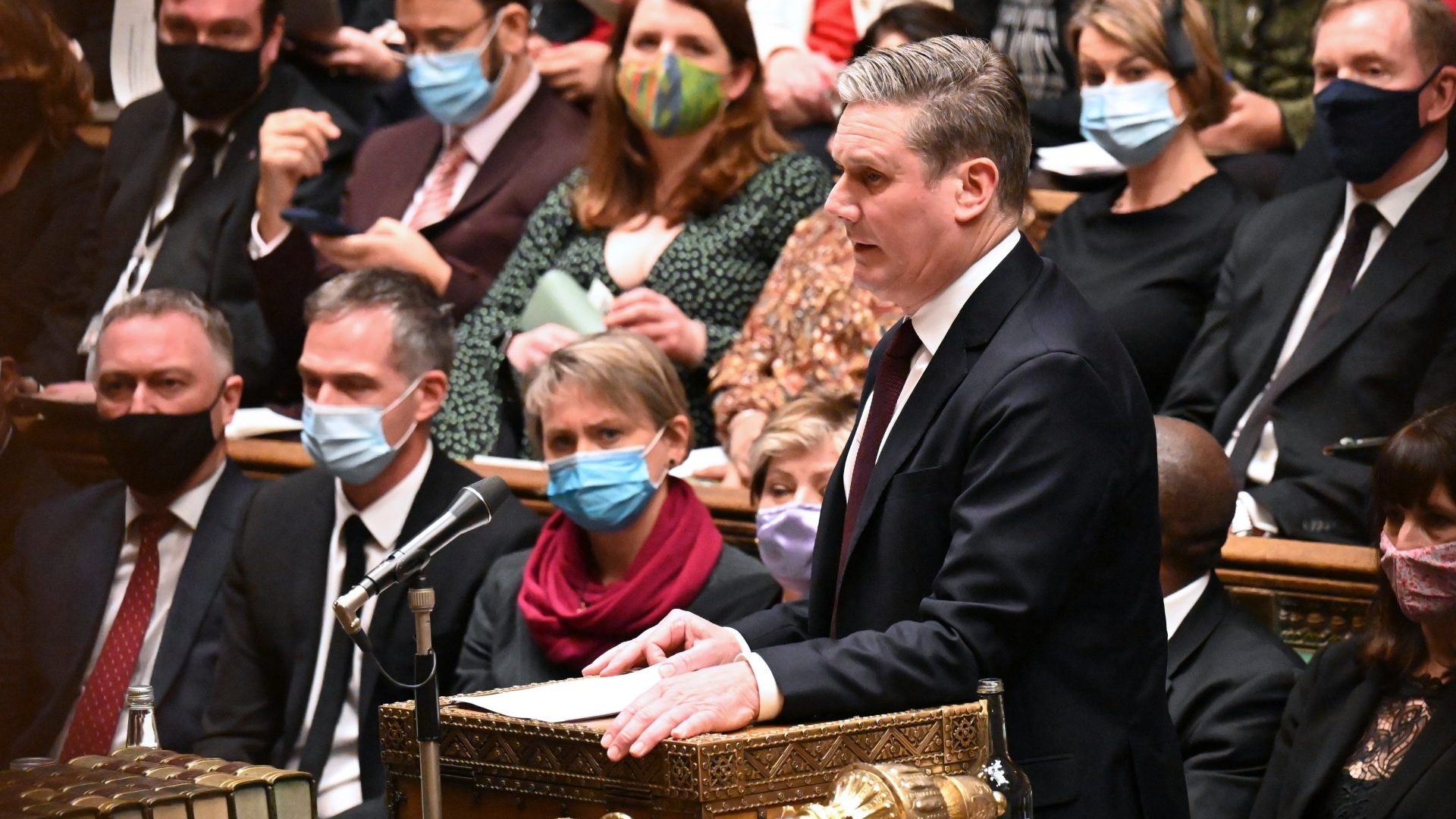Some Tory MPs want Boris Johnson out. Some Tory MPs want Boris Johnson in. And the prime minister is attempting to win over waverers with a Brexit reboot – “Our new Brexit Freedoms Bill will make it easier to get rid of retained EU law, the weird system by which EU legislation occupies a semi-sacred place on the UK statute book,” he told the Daily Mail this week.
There are sensible ways for Britain to reset its relationship with the European Union. But whether Johnson gets to carry out his long-anticipated “war on red tape” or whether he is deposed, a government led by the Conservative Party is unlikely to deliver any of them.
Those who back Johnson and are cheered by his diplomacy – last week he called the EU “insane” – want to see him give Europe a kicking, possibly with negative implications for the British workers and parents who their regulations protect. Those, like David Davis, who want him gone don’t want to see Johnson replaced by a Remainer or even a pragmatist. They want a Brexit ultra who will lead them to the “sunlit uplands” of Brexit (to steal another quote from WWII history).
Most Conservative MPs and members would only replace Boris Johnson with someone more committed to Brexit, not less.
This is why you have to be careful not to believe or even hope that if Sue Gray, the Met or someone else brings an end to Boris Johnson’s political career will bring an end to Brexit or even lead to the UK re-entering the EU; it will not and cannot do that.
The hard fact is that the best we can hope for at this moment in time is something far short of a return to the EU; it is that the worst effects of Brexit can be ameliorated. Unfortunately, even that would be very unlikely to happen if Boris Johnson was to fall.
Both constituencies who would elect the next prime minister — Tory MPs, who would whittle down the shortlist, and Tory members, who would vote on the final two — are likely to respond most positively to candidates who strongly defend Brexit while castigating the EU and ratcheting up the rhetoric on the Northern Ireland Protocol.
But it is possible to see a different way ahead, one which would leave both the UK and the EU in a much more realistic and practical arrangement. It’s one that British business is crying out for and one that any sensible politician could easily defend as being what most people voted for in the referendum.
For a start, the current deal with the EU, the Trade and Cooperation Agreement, is a dog’s dinner. The UK lost out on many perfectly sensible solutions either because it was so desperate to get a deal, any deal, done quickly or because, in many cases, it did not even ask for things that the EU was perfectly willing to agree to.
So, the first thing that the next British administration should do, if it has any common sense, is to try and cut a deal keeping financial services in the UK.
Last week the Brexit-boosting Sunday Telegraph, no less, reported on the front page of its business section that US banks alone had moved or recruited 2,000 new staff within the EU. Post-Covid, this trend of migrating focus away from London is likely to accelerate.
The European Central Bank is now insisting that not only people, but capital and resources move within their jurisdiction. Its logic is that if foreign, including British, banks are to do business in the Eurozone, then the ECB would sort out the mess if they went bust, as many did in 2009. Why then should it let them be regulated by London when the ECB would have to pick up the bill if those regulations fail to prevent another credit crunch?
This alone will not be enough to destroy the City as the financial centre of Europe but it weakens it, at the same time strengthening EU27 financial centres which are picking up business that traditionally would have been impossible to prise away from London.
Then there is the ridiculous situation where the UK is forcing vast swathes of industry in the UK to re-test and validate its products to meet UK standards and get a UK kitemark instead of the CE mark that every product has carried for years to show it is safe to sell anywhere in the EU.
So far these tests have not really varied from the ones in force in the EU, but the longer term plan, at least in the eyes of the Singapore On Thames fans, is to reduce standards and regulations to give British companies an “advantage”. Except there is no advantage to be had if, as the majority of manufacturers will, you want to sell your goods in the EU, where the CE mark will still be required. British firms will, therefore, have to test products twice, at vast expense for no good reason.
The inevitable consequence will be that if UK standards fall short of EU ones, firms will just produce to EU standards, knowing full well they will easily meet UK ones.
The chemicals industry has its own special version of this hell. REACH, the EU’s chemical regulatory system is world-class, costs a fortune to join, but has been a massive success. The industry has been lobbying hard to stay in REACH. The UK government could have paid some money into the system and stayed in but instead it created BREACH – yes, you guessed it, a British REACH. With just the same rules and safeguards because the regulator was in a hurry and so just copied and pasted the EU’s rules.
British chemical manufacturers will now have to test all their products to meet two regulators’ rules, for no reason other than Brexit bloody-mindedness.
There is, however, a silver lining, of sorts. The British government might allow British chemical plants to use and produce more dangerous and polluting chemicals for longer than the EU. This might save British firms a bit of money, but of course, none of those products could be exported and they would all be more dangerous. You probably didn’t see that on the side of a bus.
No wonder the UK has kicked these measures down the road several times. They serve no purpose but placing huge costs on UK business that EU firms don’t and won’t have.
The UK government could also cut miles of red tape at the border with the EU if it agreed to abide by its existing Sanitary and Phytosanitary rules. These are the regulations that cover every form of food and agricultural produce. But rather than stick with the EU rules which every farm, abattoir and food plant follows now, the UK has decided to go it alone and implement its own standards. Mainly so it can do trade deals with countries like the USA, which have much lower food standards.
But the price of that freedom is immense. Production facilities, food products, raw meat, and bedding plants, basically anything to do with agriculture and food, now need proof at the border that it meets EU standards. Since food and drink are the UK’s largest manufacturing sector the disruption, cost and bother will be immense. The so-called benefits, trade deals with New Zealand and Australia, cannot possibly offset the damage these changes involve but they also mean UK farming faces a bleak future, as cheap imports, often produced with lower standards, flood their market.
The simple answer is to agree to abide by EU standards, however; just saying you will won’t cut it. You’d have to sign a treaty saying you will, but the savings would be huge. The EU’s chief negotiator, Maros Sefcovic calculates such a deal would “do away with the vast majority of checks” between Great Britain and Northern Ireland (including the need for pet passports) and the same would be true at Dover as well, where the checks are due to be introduced later this year.
There are a dozen other areas where a pragmatic government could improve matters but I will mention just two more.
Posted workers are ones who are sent to work abroad for a few hours, days or weeks and in the EU’s Single Market such trips were a very simple thing to arrange. Now many UK staff going abroad will need visas, and those visas are issued by the individual member states not the EU, with their own individual rules and regulations. In theory, British workers could attend a conference in Berlin as a tourist, but not take notes there, because that would mean working in Germany without a visa. It is a minefield and places British firms at a serious disadvantage. The levels of administration alone are potentially material.
Covid has masked this issue because far less travel has taken place, but it is one reason British companies are now so keen to hire people with EU member state passports, as this issue does not limit their rights. This too could have been part of the TCA but the UK negotiators, apparently, didn’t think to ask. Since this will hit service companies the hardest and the UK is a service-based economy this was a terrible mistake but it could be reversed with a pragmatic approach.
Finally, there are a whole host of EU agencies and schemes that it was irrational to leave and which the UK could have maintained access to if only it had asked and been willing to pay some money into the kitty.
GPS system Galileo, which the UK spent a fortune developing, cross-border education scheme Erasmus+, which has been replaced with a much worse and more limited scheme, Europol to name just three.
The UK has agreed to maintain associate membership of Horizon, the massive and successful scheme to coordinate university research across Europe. However, delays to its ratification are creating serious problems for the UK’s universities. The delays have been caused by serious doubts on the EU’s side about the UK’s honesty and willingness to abide by the Northern Ireland Protocol. Being trustworthy really counts in international relations.
All the above problems could probably be solved to the UK’s advantage quite easily. Some would involve paying the EU money and abiding by some of its rules but the savings to the UK and the markets it would open up would far outweigh all that. So why hasn’t the UK done the sensible thing?
The main reason is that the government is motivated more through fear of its own backbenchers and the prospect of Nigel Farage re-entering politics than its desire to act in the national interest.
The UK’s national interest has been undermined by those Brexit supporters who are happy that Brexit has happened even if it is terrible for the UK because of their long-held philosophical hatred of the EU and all it stands for.
But a rational, sensible, realistic, and pragmatic government that explained plainly and clearly that cooperating on environmental protections or product safety was good honest British common sense could, once again, leave such people ranting in the dark.
After all, voters were promised a seamless deal, one with all the benefits of EU membership and none of the costs or slightly more practicably a relationship like the one Norway enjoys.
What they got was not what they were sold and getting a better deal could be both practical and popular.
None of this however is going to get the UK back into the EU.
The Conservative Party has now been taken over by the ultras and no one could renegotiate membership when one of the two major parties is promising to leave again the second it gets back into power.
So, such measures would not lead to the UK re-applying for EU membership and even if it did it would be unlikely to succeed. Quite simply the UK could not be trusted to stay or act reasonably or even be trusted not to try to destroy the EU from the inside.
That is the permanent political and diplomatic cost of Brexit. The UK is a smaller, less important, less trusted, less respected, and less influential player in world affairs.
But a period of common-sense reforms which would immediately benefit the UK’s economy, its people and its institutions might also do something to regain some of its reputation.




